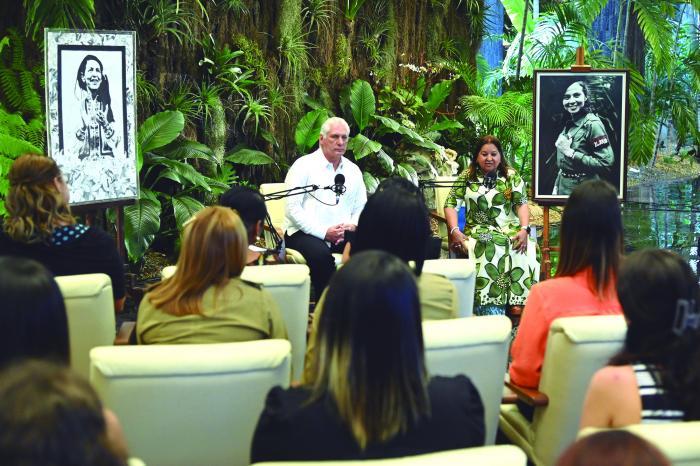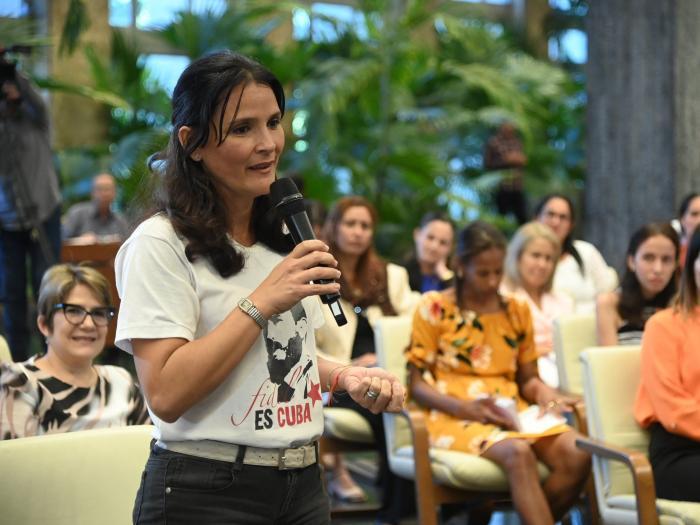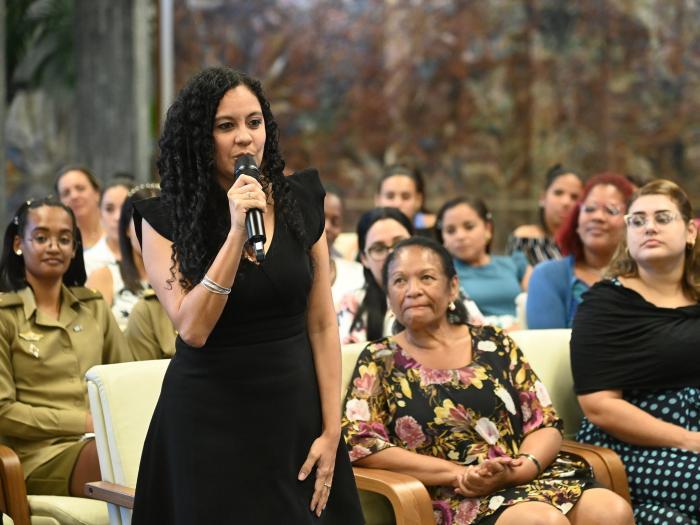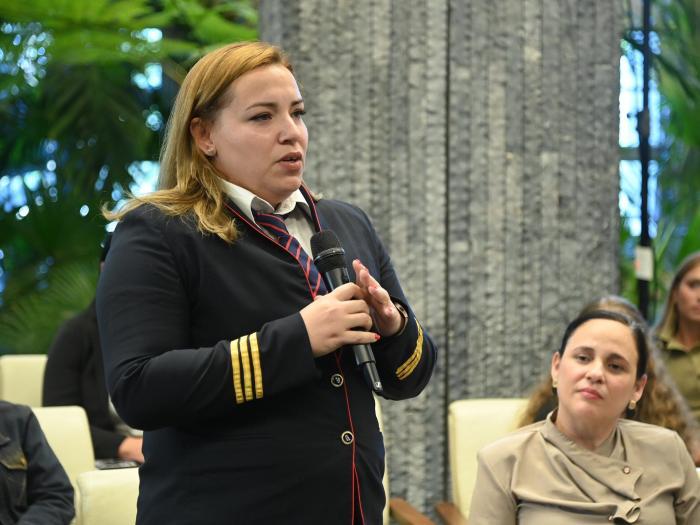
Diverse voices and unique emotions, born of sensitive, warrior, defiant women... filled last Saturday afternoon the emblematic Portocarrero Hall of the Palace of the Revolution. Women of several generations, protagonists of daily battles, young women who carry in their hands the strength of the present were received by the First Secretary of the Central Committee of the Communist Party and President of the Republic, Miguel Díaz-Canel Bermúdez, in that space full of symbolism, where the history of Cuba beats and the legacy of Celia and Vilma is kept alive.
In every face there was a story; in every look, the pride of being also continuity of the Homeland. And where Celia Sánchez left traces that are today part of the soul of the nation, and where transcendental decisions for Cuba have been forged, a handful of heroic women, representing thousands of others, ratified with their words the unwavering commitment to continue building, from love and resistance, the Cuba for which so many fought and continue to fight.
A REVOLUTION MADE BY MEMORABLE WOMEN
The Head of State described the Cuban women as heroic women, who said he was happy to have shared, precisely on International Women's Day, the life stories of a handful of warriors who, from a score of sectors, enhance day by day the work of the Revolution. The meeting was attended by Political Bureau member Teresa Amarelle Boué, secretary general of the Federation of Cuban Women (FMC).
Some younger, others not so young, but all united by the conviction of how much Cuban women mean in the history of the nation and in the daily defense of the conquests that we have been winning through sacrifice.
Journalist and historian Dayli Sánchez Lemus, who today assumes the responsibility of being the deputy director of the Office of Historical Affairs of the Council of State, spoke passionately about the noble soul and tireless spirit of Celia Sánchez, a place that was born from the drive and vision of Celia, who always defended the importance of preserving even the smallest detail of history.
In the photographs and documents stored there, she said, a wealth of ideas, anecdotes and knowledge is preserved, which is essential to take to the youngest, because "what you do not know, you do not love, and what you do not love, you cannot defend."
Two other dear women who are in charge of important house-museums in the country, in which the history of the woman who was once a woman who shudders at the mere mention of her name is carefully treasured, also spoke of the child Celia, daughter, sister, friend.
Cedalia Cabrera Motne, who for more than 50 years worked at the Palace of the Revolution and had the privilege of working closely with Fidel and Celia, and of helping to materialize many of the projects born of their ingenuity, also shared her experiences with joy and pride. "After so many years, to see this youth of women, with that love, with that desire to succeed, fills us with pride; before there were only a few of us, today there are many," she said.
Colonel Tania Sánchez Limonta, who worked in the Border Brigade for 25 years, becoming second in command of that unit, could not help but be moved when she remembered Vilma, from whom she learned that "love is also very important for the fulfillment of missions," a principle that she has always tried to apply in her career, however complex military life may be.
To Fidel, also her gratitude, because when he decided to create in 1958 the Marianas' Platoon, she emphasized, he turned us women into the eternal escorts of the Cuban Revolution.
"Thank you for opening the doors of a sacred place like the Palace of the Revolution to talk about women as great as Vilma and Celia," said Yunet López Ricardo, head of the audiovisual group and journalist of the Fidel Castro Center.
Their stories, he assured, are in the most unexpected places, and it is very important to bring their energies to "the girls of today, that they find inspiration in them; it is very important to move, we must be able to move to realize that the war was not only storms of bullets, but also many storms of feelings".
A GROWING, RESOLUTE YOUTH
The women present at the meeting, who work in the most diverse trenches of society, shared life stories and dreams; they talked about challenges, commitment and how much the legacy of irreplaceable women like Vilma and Celia has meant in the battle of their days.
The voices and experiences of an aircraft pilot; of the Chief of Maintenance of the Antonio Guiteras Thermoelectric Plant; of educators; of a prosecutor; of a judge; of a pre-university student and two future Journalism students who are doing their voluntary female military service... were heard this afternoon at the Palace of the Revolution, each one with her own battles to fight, but all united in the purpose of continuing to build the Homeland.
And how much more can be done in the communities, together with the FMC, to continue raising the role of women in society, commented Amalia Diaz Perez, president of the Federation of University Students (FEU), at the Faculty of Philosophy of the University of Havana. All the history we have built, she considered, has to serve us also to see how we are going to use it.
Anyone who sees young Lisy Delgado López, a chemical engineering graduate, would not imagine that she is in charge of a communitarian farm in the municipality of Cárdenas. Two years ago she left her job in an office to promote a project that at the beginning had many detractors, precisely because she was a woman, but that today has the recognition of an entire community and magnificent results.
For me, this has been one of the biggest challenges," confessed the young woman, who wears a pair of high heels and rubber boots with the same skill, that Saturday afternoon, because "for a moment I doubted I could make it, and today, as we move forward, new ideas constantly occur to us, and it is a path, in which when one begins to advance, one does not know what the limit is, because it is a path that one travels and in which one is always taking steps."
Dr. Carema Sarabia Aguila, who graduated a little less than a month ago from the University of Medical Sciences of Havana, also shared her emotions during the afternoon, with the commitment and sensitivity that the noble profession of medicine entails.
The important thing today, she said, is not to do great things, but that everyone, from his or her own space, builds and contributes to the Revolution. In her words, the lineage and sentiment of so many worthy women who have in their hands today the future of the Homeland, because the position of all, she said, "should be to build, to add, not to sit in a chair to criticize, because that way, really, you do not solve anything; And I always say that when the history of Cuba is written, I want to be on the bench of those who built, on the bench of those who did, on the bench of those who transformed, on the bench of those who contributed, and not on the bench of those who simply sat down to criticize, without doing anything."
Before the end of the meeting, the Cuban President called on them to continue doing, and thanked them for the stories shared, because what you have done, and many others, is also thanks to the work of Celia and Vilma, in whose legacy there is always a constant learning process.
Celia used to say, the Head of State recalled, that "it is not about being a hero, it is about never stopping fighting". And I believe, he considered, that this is "the conviction that we can share here today and weave in our revolutionary feeling."
You -she concluded- are women with a strength of soul and spirit, with tremendous hearts, and I can simply tell you that Cuban women are wonderful women.


















